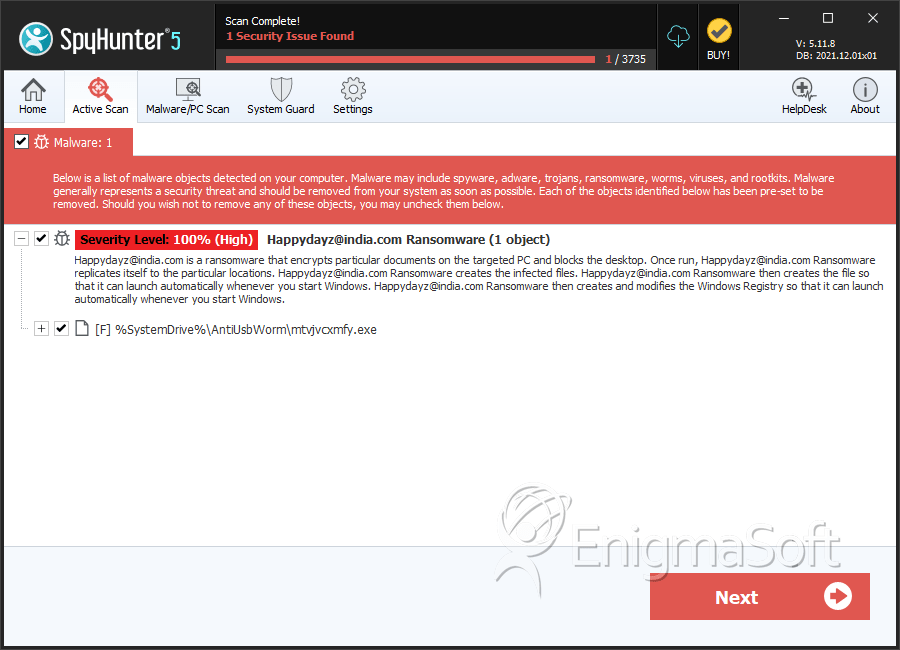'Happydayz@india.com' Ransomware
Threat Scorecard
EnigmaSoft Threat Scorecard
EnigmaSoft Threat Scorecards are assessment reports for different malware threats which have been collected and analyzed by our research team. EnigmaSoft Threat Scorecards evaluate and rank threats using several metrics including real-world and potential risk factors, trends, frequency, prevalence, and persistence. EnigmaSoft Threat Scorecards are updated regularly based on our research data and metrics and are useful for a wide range of computer users, from end users seeking solutions to remove malware from their systems to security experts analyzing threats.
EnigmaSoft Threat Scorecards display a variety of useful information, including:
Popularity Rank: The ranking of a particular threat in EnigmaSoft’s Threat Database.
Severity Level: The determined severity level of an object, represented numerically, based on our risk modeling process and research, as explained in our Threat Assessment Criteria.
Infected Computers: The number of confirmed and suspected cases of a particular threat detected on infected computers as reported by SpyHunter.
See also Threat Assessment Criteria.
| Threat Level: | 100 % (High) |
| Infected Computers: | 16 |
| First Seen: | February 19, 2017 |
| Last Seen: | October 24, 2025 |
| OS(es) Affected: | Windows |
The 'Happydayz@india.com' Ransomware is a variant in the Globe v3 family of encryption ransomware Trojans. The 'Happydayz@india.com' Ransomware carries out a typical encryption ransomware attack by encrypting the victim's files and then demanding that the victim pays a large ransom to recover the affected files. The files encrypted by the 'Happydayz@india.com' Ransomware attack can be identified easily because the 'Happydayz@india.com' Ransomware will mark them by adding the extension '.happydayzz' to the end of each file's name. The 'Happydayz@india.com' Ransomware will drop its ransom note in the form of an HTA file named 'How To Recover Encrypted Files.hta,' which displays a program window with the 'Happydayz@india.com' Ransomware ransom message. The 'Happydayz@india.com' Ransomware ransom note simply states that the victims should contact the email address happydayz@india.com to receive instructions on how to pay the 'Happydayz@india.com' Ransomware ransom.
How the 'Happydayz@india.com' Ransomware Trojan may Enter a Computer
There are countless variants of the 'Happydayz@india.com' Ransomware, all belonging to the Globe ransomware family. This is a very large family of ransomware Trojans that has been responsible for countless attacks on computer users. The attacks vary very slightly from one variant to the other, such as using different email addresses and file extensions. However, they all use code identical virtually and are the same ransomware Trojans under different disguises essentially. In most cases, the 'Happydayz@india.com' Ransomware is distributed through the use of corrupted file attachments. Con artists may use spam email campaigns to send out email messages that seem to have been sent by banks or by social media platforms (or a variety of other trustworthy senders), which will include a file attachment. These file attachments, commonly DOC or PDF files, abuse macros to run corrupted code on the victim's computer as soon as they are downloaded. Because of this, handling any unsolicited email attachments with caution can prevent infections. Apart from spam email campaigns, threats like the 'Happydayz@india.com' Ransomware also may be delivered using targeted email messages that spoof the email address of a person of authority at a company or institution or make it likely that the victim will open the corrupted email message. The 'Happydayz@india.com' Ransomware can spread in other ways, including corrupted files on file sharing networks or by hacking into the victim's computer directly.
Dealing with Infections Like the 'Happydayz@india.com' Ransomware
Unfortunately, threats like the 'Happydayz@india.com' Ransomware use strong encryption algorithms to make it impossible for computer users to recover their files after an attack. During an attack, the 'Happydayz@india.com' Ransomware will encrypt most of the victim's files, targeting a wide variety of file types, including databases, media files, configuration files, documents created by a variety of applications and numerous other file types. Essentially, the 'Happydayz@india.com' Ransomware will encrypt the victim's data while avoiding files that Windows requires to work normally. The 'Happydayz@india.com' Ransomware's ransom note will alert the victim that they need to pay a ransom ranging from 0.5 to 1.5 BitCoin to recover from the attack. The victims may not be given instructions for payment until they contact the email address associated with the 'Happydayz@india.com' Ransomware attack.
Unfortunately, once the 'Happydayz@india.com' Ransomware encrypts the files, it may not be possible to recover them without the decryption key, which the con artists hold in their possession. Because of this, it is essential that computer users use preventive measures to limit the damage from a 'Happydayz@india.com' Ransomware attack. In the case of the 'Happydayz@india.com' Ransomware, the ransomware Trojan can be removed easily with the help of a skilled and updated security program. However, even after removal, the victim's files may remain encrypted and inaccessible. Because of this, having backup copies of all files is the best protection against threats like the 'Happydayz@india.com' Ransomware. If victims can recover their files by simply restoring them from backup copies, then the people responsible for the 'Happydayz@india.com' Ransomware lose any ability to demand a ransom payment.
SpyHunter Detects & Remove 'Happydayz@india.com' Ransomware

File System Details
| # | File Name | MD5 |
Detections
Detections: The number of confirmed and suspected cases of a particular threat detected on
infected computers as reported by SpyHunter.
|
|---|---|---|---|
| 1. | mtvjvcxmfy.exe | 4071a0e28a5f23406e00c8f7e93caea9 | 8 |
